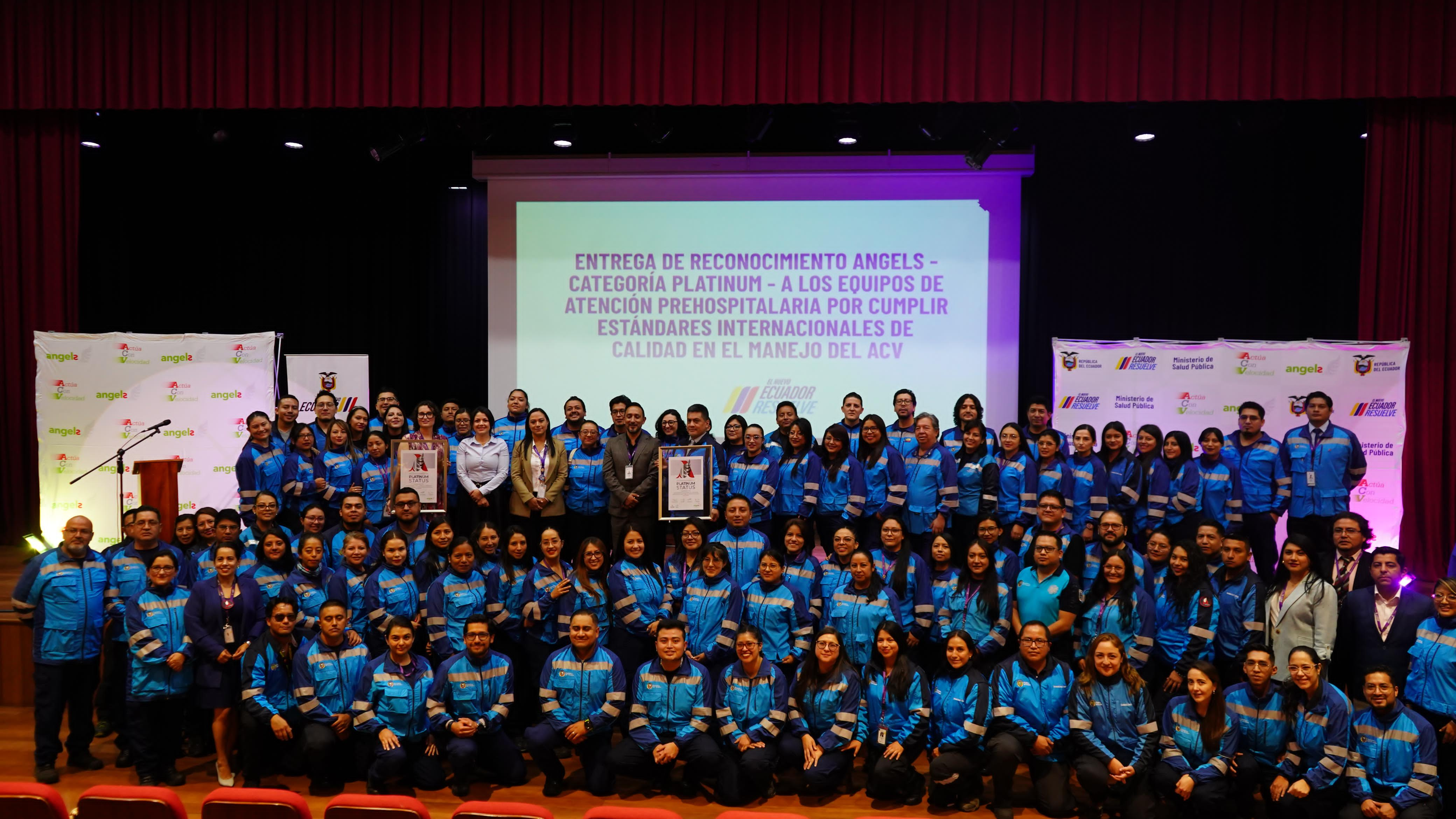The EMS Angels Awards criteria are are more than a tool for evaluating and rewarding performance. They will also serve as a checklist for providers of pre-hospital stroke care and help identify opportunities for intervention and improvement.

The relay race is one of the most electrifying events in athletics, a rousing display of teamwork and coordination. It delivers the spectacle of an individual sport being transfigured into a team sport, with each runner performing at the height of their powers to reach a common goal.
As well as fast, the first runner has to be a steady and reliable starter – after all, the entire outcome of the race will depend on their ability to get off the mark and up to speed.
In the race to deliver the best outcomes for stroke patients, it is the Emergency Medical Services (EMS) who run the first leg, with every second gained improving the outlook for the rest of the team. In recognition of their crucial role, and as a spur to improving performance, the EMS Angels Awards now aim to give the providers of pre-hospital stroke care a place on the podium.
With this new award the Angels Initiative seeks to replicate the positive impact the ESO Angels Awards have had on the quality of in-hospital stroke care. Since its inception in 2017, the Angels Awards programme has helped establish a culture of continuous quality monitoring in stroke units, with the awards criteria functioning as a set of key performance indicators for stroke teams.
The EMS Awards criteria are more than a tool for evaluating and rewarding performance. They will also serve as a checklist for providers of pre-hospital stroke care and help identify opportunities for intervention and improvement.
Benchmarking for better care
Benchmarking begins when EMS services assess their own eligibility to take part in the awards programme. To be considered for an award, they must first meet a set of criteria that includes having a stroke protocol in place, using specific stroke scales to assess patients, and collecting and recording relevant performance data in respect of at least 30 consecutive stroke patients in a given quarter.
As is the case with the hospital awards, EMS Awards are allocated at three levels (Gold, Platinum and Diamond) based on the performance by an EMS service against five award-level criteria. To qualify for Diamond status, for example, the data must show that the team has achieved a median time on scene of under 20 minutes, and that in at least 95% of cases they have pre-notified the hospital, delivered the patient to a stroke-ready hospital and recorded details of patient medications and time of onset.
Even though stroke is a leading cause of death and disability across the world, stroke patients account for a relatively small percentage of the emergencies an EMS team can expect to deal with in the course of their work, says Angels Initiative co-founder and project lead Jan van der Merwe. As a result, stroke protocols may be in place without necessarily being top of mind. The awards criteria bring the key components of pre-hospital stroke care into focus and make data collection integral to care, thereby creating the necessary conditions for quality monitoring.
Ultimately the purpose of the awards is to ensure that the maximum number of stroke patients are correctly assessed, adequately supported and rapidly distributed to an appropriate stroke centre where pre-notified stroke teams are ready to meet their treatment needs.
Raising morale raises the game
Raising the morale of EMS services has seldom been more urgent or important, says Dr Nicolas Riera, an emergency physician from Madrid, Spain. Dr Riera is the stroke code co-ordinator at Madrid's medical emergency service SUMMA 112, and his office on any given day is an advanced life support ambulance or a medical helicopter.
Madrid has been at the epicentre of the pandemic in hard-hit Spain where the coronavirus has infected over 3,5 million people and claimed more than 78 000 lives, disrupting health services and taking a heavy toll on frontline medics.
"Motivation is very important now," Dr Riera says. "Paramedic teams need something new to reboot their mindsets in the context of an ongoing pandemic."
Having their efforts acknowledged amid a spirit of friendly competition among teams is a potentially powerful way to raise morale and reward EMS personnel for raising their game.
But it isn't only about motivation, adds Petr Jaššo, Chief of Education of EMS in Ostrava in the Czech Republic, where coronavirus deaths per capita are among the highest in the world. Working with regional neurologists and the Angels Initiative, he organizes regular training sessions on stroke patient management for EMS professionals and serves on the Angels Steering Committee in the Czech Republic.
Stroke care has come under intense pressure as a result of the pandemic and quality management is therefore critical, Petr says. "The positive impacts of the hospital awards on treatment quality have been absent from the EMS environment," he says. "It is what the EMS guys have been waiting for."
Even more than rewarding pre-hospital stroke care providers for past performance, the EMS Awards should raise the standard of care by highlighting weaknesses that can be addressed by specific targeted actions.
"The awards are not about past work but mainly about future work, Petr says. "Their impact will be measured in 'minutes bought' through empowering EMS teams to correctly diagnose and transfer patients to the correct stroke centre within the window of possibility for recanalization."
Credit where it is due
Across Europe the quality of pre-hospital stroke care varies from country to country, says Jan, and in a handful of regions EMS services have no stroke protocol at all.
"The EMS Awards offer a wonderful opportunity to identify and intervene in gaps such as these by providing the protocol and assisting with its implementation, while at the same time giving these teams an additional reason to want to change the way they do things."
As with the hospital awards, the EMS Awards aren't targeted at national service providers but instead seek to reward regional teams.
"It is important to acknowledge the people who deserve acknowledgement," says Jan.
In the context of stroke care a well-run relay means better outcomes for stroke patients and their families, with fewer deaths and more stroke survivors being able to live independent, meaningful lives. It is the aim of the EMS Awards to give credit to those people who day after day come out of the starting blocks to run the race.





